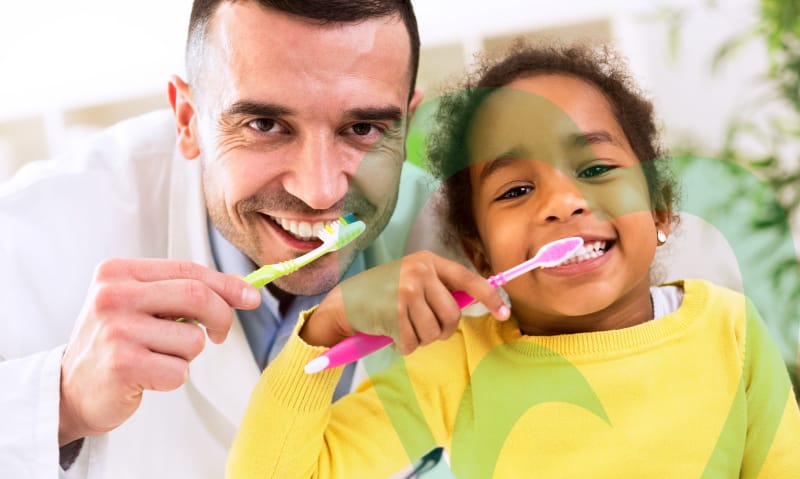Help! My Child Doesn’t Want to Brush Their Teeth. What Can I Do?

How to Help Your Child Love Brushing Their Teeth
Developing an effective oral hygiene routine and sticking to it isn’t always easy, even for adults. Sometimes, children and teenagers need extra help in establishing an effective routine. These simple tips can help your child brush their teeth to provide a solid foundation for their continued oral health.
Toddlers and Preschoolers Who Don’t Like Brushing Time
For children under six, it’s best for parents to play an active role in helping with the brushing routine. You may find that your child strongly resists brushing time, but understanding the potential causes behind their feelings and making adjustments to the routine can provide a better experience for both children and parents.
1. Could the cause be sensory issues?
The method you’re using to brush your child’s teeth could be causing sensory issues, leading to discomfort. For instance, you could be causing strain against the frenulum, the soft tissue at the top of the mouth between the lips and gums. Try brushing carefully and gently to avoid sensory issues, and monitor your child for reactions that might indicate discomfort.
2. Choose the right toothpaste.
Your child could dislike brushing time due to the flavor of the toothpaste you use. If you’re using adult toothpaste, the mint flavoring can be overpowering. Find flavors specifically for children and let your child try out a few to choose one that suits them. Look for the American Dental Association seal of acceptance to ensure your child’s toothpaste meets rigorous standards for safety and efficacy.
3. Find the right toothbrush.
Choosing the right toothbrush is just as important. Toothbrushes come with bristles of varying softness, so choose a soft-bristled version to ensure your child can brush comfortably without risking damage to the enamel on their teeth.
Electric toothbrushes are highly effective, but the vibration could be a bit much for your child. You might consider three-sided toothbrushes, an innovative option that makes getting complete coverage of every tooth easier.
4. Give your child some options.
You can help your child become more enthusiastic about brushing by letting them play more of a part in the decision-making.
Let them choose the toothbrush they like, whether just a specific color or one of the many kid-friendly-branded designs. Dental floss also comes in many colors, and you can let your child choose that as well. Many parents use a two-minute song to time brushing, and this is another choice your child could make from a suitable selection.
5. Stick with a routine.
One of the best tips on how to help your child brush their teeth involves sticking to a routine. Children are more accepting and less resistant when something is an established and adhered-to routine.
Only sticking to a routine sporadically can make brushing teeth seem like an optional activity, which may make your child more reluctant to take it on.
Children and Teens Who Aren’t Following Their Brushing Routine
Past the age of six (and once you’re sure they’re ready), your child can start brushing independently. At this stage and beyond, parents may find that their children need reminders or toothbrushing tips to ensure they’re brushing effectively, or that they need a gentle push to stick to their oral hygiene routine.
There are several reasons why your child or teen may not be following their brushing routine.
1. Your child might not have been ready for independent brushing.
If your child isn’t brushing and flossing properly, it could be because they just weren’t old enough to do a good job when they first started brushing independently. Six is a good guideline for when to start independent brushing, but a child under the age of nine who is still struggling could likely use more direct help.
2. They could simply need a reminder.
If your child isn’t brushing, they may need a reminder. Asking your child if they’ve brushed their teeth today could be enough if your child is simply forgetting as opposed to actively avoiding brushing. You can try using an oral hygiene app on a tablet or smartphone as well for reminders and to time brushing.
3. Demonstrate that you trust them.
Giving your child a bit of space could show them that you trust them to handle brushing themselves. You’ll still need to check in from time to time, but at some point, giving them full brushing independence is the right move.
4. Mark their progress.
When your child starts independent brushing, it can be a good idea to track your child’s progress and congratulate them along the way. Using a simple sticker sheet each time they brush is more than enough, or you could implement other rewards as you see fit.
5. Discuss dental phobia and dental anxiety.
Is your older child or teen avoiding brushing? They could be dealing with sensitivity or pain they don’t want to talk about. They may be anxious or frightened about the prospect of seeking out treatment. To help overcome these fears, you can talk with your child about the importance of seeing the dentist and how treatment can help.
Your Family Dentist in West Omaha
No matter what stage of life your children are at, you can count on The Tooth Doc for reliable care from a dentist for children and the whole family. If you’re concerned about your child’s development, or if it’s time for a routine dental exam and cleaning, contact our office to schedule an appointment today.